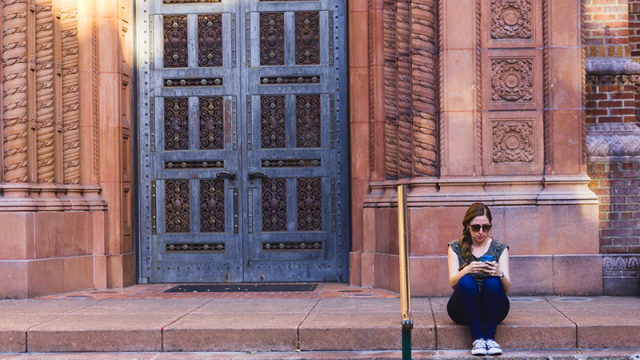6 ways to protect your privacy while mobile banking
We live in a hyper-connected world where countless apps and platforms ask for your contact info, social media data and location. And most of us have gotten used to trading our privacy for convenience.
But there’s one area where you should never compromise your privacy: your mobile banking app. When you log in to mobile banking, you’re opening a channel to some of your most sensitive data — not to mention all of your money. That’s why it’s important to safeguard your privacy and keep your online banking credentials secure.
Here are five ways to protect your privacy while using mobile banking:
1. Keep your phone, computer and other electronics up to date.
Software updates are a crucial part of your security. They close emerging security gaps and make it that much harder for fraudsters to slip through. Software updates are the main way your electronics learn how to prevent new scams. You can set programs to automatically update and most modern apps enable notifications to let you know when your existing software is out of date.
Software updates happen frequently. Automatic updates make managing that a bit easier.
Another way to know that your software is out of date is by watching how it performs. Outdated programs may crash frequently and run significantly slower. Manually check that your apps are up to date by either visiting your app store or checking for an update button in the app itself.
Remember, fraudsters are constantly finding new ways to get data. Protect your privacy and security by actively keeping up with updates.
2. Create an ironclad password.
Experts suggest using different passwords for everything. But if you do tend to reuse the same password (though we wouldn’t recommend it), at least take the precaution of using a unique password for mobile banking.
Anything to do with your finances deserves an extra layer of security and a unique password provides just that. Throw in uppercase letters, special characters, intentional misspellings and anything else you can think of to make guessing your password as hard as possible.
The two most common ways fraudsters gain passwords are either by phishing your private information and using that to guess your password or by using brute-force hacks. A brute-force hack means guessing every possible combination of letters, numbers and special characters until the right one is entered. Long, complex passwords make brute-force hacking almost impossible. (Literally, it can take years before a brute-force hack can guess a hard password.)
As always, we do not recommend using birthdays, names or other easily discoverable information for your password. Instead, use passphrases — long, grammatically illogical phrases, like 1ON&P1nKCh@1r$PvrpilSky (Ion & pink chairs purple sky). Given no clues, that passphrase is unguessable. Come up with your own and start using a passphrase to secure your data.
3. Avoid public Wi-Fi.
Free Wi-Fi is one of the most overlooked avenues for data breaches. Don’t get us wrong, public Wi-Fi is great for information that you don’t mind being public. But private info like online banking credentials can easily be intercepted by fraudsters with a little technical ability. When you bank on the go, use your own data network, not a public one.
4. Log out when you’re done.
Staying logged in to your favorite apps may be convenient, but it puts you at risk if your device gets lost or stolen. Always log out at the end of your mobile banking session. A lot of financial apps will log you out automatically, but it’s better to be safe than sorry.
5. Download with caution.
Accidentally downloading malware onto your device puts all of your info at risk, including the sensitive data in your mobile banking app. Do your best to keep your technology clean. Think twice before downloading any app and always get your apps from the app store — not your browser.
No matter how connected you are, there are some things that should always stay private. Your mobile banking app is one of them. Developing this habit helps keep your financial info safe and secure.
6. Never give out your multi-factor authentication codes.
Multi-factor authentication, also known as MFA, is a security process where users receive a code via their phone or email in order to log in to a site (like online banking, for example). Some apps and sites may also ask security questions before granting login access. These codes and questions are crucial to fully securing online accounts and as such should not be given out. Scammers know they’ll need your MFA code to get into your private information and will ask you for it. Don’t provide it.
Special note: You may also hear the term “two-factor authentication,” also known as 2FA. It is another form of MFA. But MFAs may require more than two pieces of authentication.


